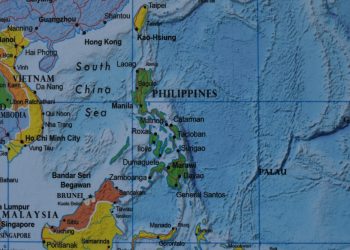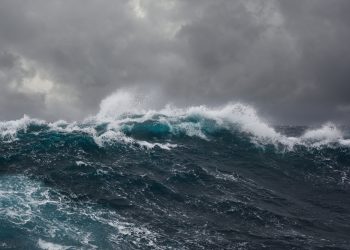Safe navigation requires from professional navigators to keep themselves up to date with new regulations, practices, technology and information sources. Celebrating release of the 25th edition of The Navigator, The Nautical Institute shared key points highlighted over the years.
1. Navigating the World
All navigators must continually update themselves to keep up with new technologies while also ensuring that they maintain their traditional skills and always practice good seamanship.
2. Avoiding Collisions
There are already many more tools available to help avoid collisions, including a wide range of electronic sensors, augmented reality (AR), Artificial Intelligence (AI) – but those covered here are still vitally important to every navigator. Always remember the key components are the human eye, intuition, experience and teamwork.
3. Passage planning
Passage planning is the best way of assessing risk and making a safe passage. Good passage planning is so much more than laying courses. It is about identifying potential risks and how they can be reduced or dealt with at the time. It should predict where extra manning may be needed and other contingencies.
4. Positioning
The Golden Rule: Never rely on a single means of fixing the ship’s position. This includes GPS and other GNSS, which should be considered a single source. Professional navigators must understand the strengths and weaknesses of position fixing, whether it be by GNSS, radar, visual, radio, sonar or inertial navigation, etc, and know how to cross-check. As with avoiding collision, use all available means to check your position.
5. ECDIS
ECDIS is a fantastic tool for improving safety and increasing situational awareness – if used correctly! However, ECDIS is far more complex than using paper charts and needs considerable training and familiarisation to use correctly. All navigators must make the effort to be both competent and confident in the use of their ship’s ECDIS.
6. Radar
Perhaps the navigator’s best friend in a world of connectivity and satellite (over-) dependency, the radar is second only to the human eye when it comes to a reliable ship-based system for navigation and collision avoidance. This is one of the most powerful tools we have to enable situational awareness in reduced visibility and at long range. Navigators should take the time to make the best of this essential tool.
7. Bridge Resource Management
All humans make mistakes at some point, but effective teamwork on the bridge can reduce this significantly, and help highlight errors before they multiply. Regardless of rank, all navigators need to have a shared plan and question each other professionally if there are discrepancies.
8. Communication
Communications rely on technology, language and cultural understanding. Never assume that a message sent has been received and understood. Always seek confirmation. This can come via message and/or body language – but make sure that you understand the confirmation.
9. Professional Development
It is essential for navigators to keep learning. This has been true for hundreds of years and is more essential than ever in modern times. Professional navigators must keep themselves up-to-date with new regulations, practices, technology and information sources. Fortunately, there are many ways to keep informed and many of them are low cost.
10. Aids to Navigation
Aids to Navigation have been evolving for thousands of years, from a clifftop fire to state-of-the-art lights and digital technology today. Navigators must keep abreast of these developments and how they can be used intelligently and practically. Regardless of technology, never underestimate the benefits of visual confirmation.
11. Building on Competence
An STCW Certificate of Competency is the start of another voyage, that of becoming proficient through continuous learning and experience. There is a lot to know out there and the world continues to evolve and develop. Keeping up with change takes effort, and professional navigators need ‘lifelong learning’ or continuous professional development (CPD). It is useful to set goals, record progress and reassess regularly.
12. Cyber Security
Everyone onboard has a role to play in ensuring cyber security– it is not just a matter for ‘IT’. It is important to have a plan for both managing security and what to do when something goes wrong, because no system is totally safe. Mobile phones are a breeding ground for malware and viruses; never integrate personal devices into ship systems – not even ‘just to charge them’.
13. Error management
Everyone makes mistakes. To avoid an incident, mistakes should be caught and averted as early as possible, but this takes good management. One of the key ways of catching a mistake is to work in teams. This is why it is important to call the Master if you are in doubt and also why you need good teamwork with your lookout. Technology can also be used to catch errors. Effective use of alarms, echo sounder and multiple position methods can save the day.
14. Familiarization
Navigation equipment comes with many interface options. Mariners need to ensure they are ‘familiar’ with all onboard systems to ensure they make good decisions. Just because you have been trained with and sailed on a ship with one type of ECDIS (for example), don’t assume that you will instinctively understand the nuances when you join a new ship.
15. Mentoring
Ships are complex places to work and live. No amount of classroom training can ensure proficiency; ‘on the job’ training is absolutely essential. Always seek to learn from others – and to help others understand. If you reflect on how you learned and who mentored you, you might consider sparing as little as 10 minutes now and then to help your fellow navigators improve their understanding.
16. Piloting
It is essential that the Pilot and bridge team work together to support each other in a two-way relationship. As an OOW you must be engaged with the Pilot and not let yourself be distracted by non-navigation tasks. If you are unsure of a Pilot’s intentions – ask! Good pilot relationships improve safety and create an opportunity for learning. Always remember that Pilots trust their lives to ship’s crew preparing a safe pilot ladder and boarding procedure!
17. Shiphandling
This is one of the most demanding skills for a navigator, and can be hugely satisfying. Take the time to reflect on each manoeuvre and what could be improved. If you have the chance, discuss it with Masters and Pilots. If you don’t have the opportunity yet, watch others and reflect on what they are doing, and when appropriate ask questions. Recording these manoeuvres and reflections can improve your performance and help identify your areas for development.
18. VTS
Vessel Traffic Services (VTS) are designed to support the navigator by providing a more strategic approach to navigating in high traffic areas and highlighting some perhaps unforeseen risks. Clear communication between ships and VTS is important, so keep your messages concise and where possible make good use of the Standard Maritime Communication Phrases (SMCPs). The development of VTS is on the increase and offers interesting employment opportunities for navigators.
19. Lookout
There are many tools to help you (radar, AIS, etc.), but 80% of information comes through the eyes. Recognise the importance of night vision (it takes 30-45 min to adjust) and the need to look behind you as well as ahead. Lookout can also include other senses, such as feeling vibration (shallow water), smells (from land), or hearing. Being constantly alert is critical. Don’t get distracted by nonnavigational tasks.
20. Navigational Assessments
Good navigation assessments are usually conducted by a senior officer who is not a member of the crew but is riding aboard as an observer. This is very different to an audit, which usually takes place over a few hours in port. If you are lucky enough to have a navigation assessor aboard it can be a great learning experience! Assessments are not like exams. They are not about pass or fail but about continuous improvement of people, procedures and even design.
21. Weather
In a climate controlled bridge with builtin bridge wings it can be easy to forget the weather – but if the vessel rolls when engineers are doing maintenance, or you take spray on deck when you have a deck crew out, it can cause trouble. There are many modern high-tech weather services available, but it is always good to read the sky, watch the sea and predict what will come next and how it will impact operations.
22. Accidents
Many similar accidents happen time and again. If you don’t want to be part of one it is best to learn from others before anything happens! There are many opportunities for learning from others, including the NI’s MARS scheme, P&I Club reports, accident investigation reports, company reports, etc. Some of the leading causes of accidents include poor lookout, complacency at anchor, distractions and fatigue.
23. Situational Awareness
Situational awareness is not just ‘knowing what is going on’. It is awareness of the environment, understanding what you are aware of and then being able to act correctly on that information. Such awareness requires using ‘all available means’, including technology and senses (not forgetting the all-important sixth sense). It is not limited to navigation, but can save the day all over the ship. Many accident reports still cite ‘loss of situational awareness’ as a main cause – it is a skill that needs to be learned and maintained!
24. New Technology
All technology has strengths and weakness and navigators need to be familiar with both. Some of this technology will have quality standards and some may not, some will be good quality and some not – and of course all tech can be hacked. Learn how to tell the difference, and report the results. Technology will transform the task of navigation and navigators will have new opportunities for working both onboard and ashore.
25. Look Astern
Another golden rule for navigators is always to look astern (on some ships more than others…) In this 25th issue of The Navigator, it is worth looking back on the significant body of knowledge in the backlog of issues covering all of these subjects.





























































